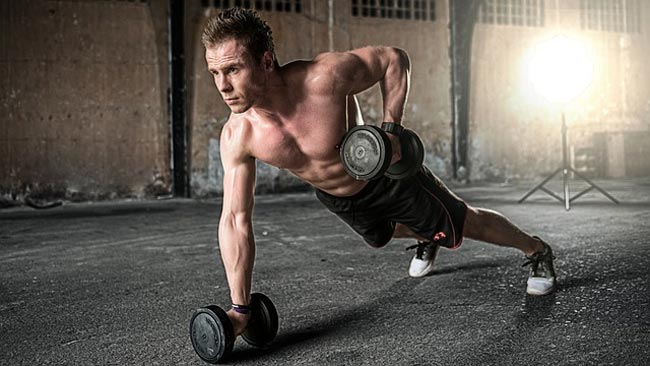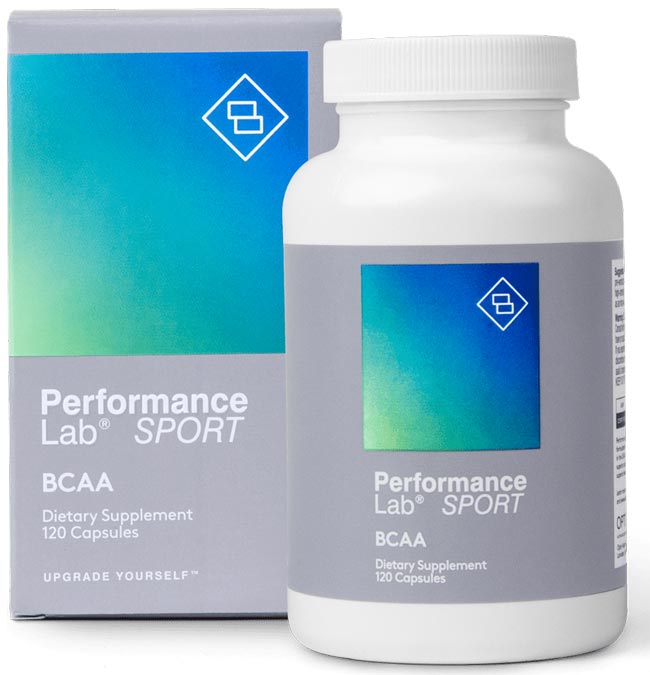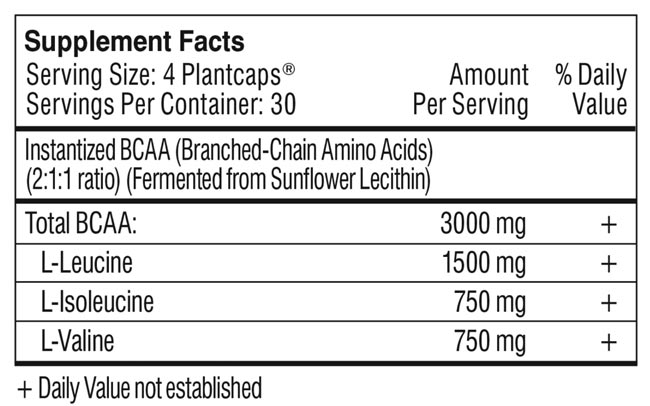The phrase “plant-based muscle” should be redundant. When you consider the enormity of giraffes, elephants and rhinos, it seems that eating plants is actually the best way to build muscle.
In fact, the ten biggest land animals are all herbivores.
Muscles ARE plant-based! Fundamentally speaking.
The fact is the biggest boys on planet Earth actually eat plants. And most meat-based foods are essentially plant-based byproducts.
You certainly can build a damn-good physique eating a plant-based diet. And science shows that supplementary muscle gains, those that go beyond simply eating whole, plant foods, can be aided by Branched-Chain Amino Acid (BCAA) supplements.

Best Vegan BCAA Guide: How to Maximize Plant-Based Muscle
Branched-Chain Amino Acid (BCAA) supplements help with anabolic muscle and strength growth. But bear in mind: not all amino acids are branched-chain amino acids.
There are 20 amino acids used to synthesize proteins in the body. Of those 20, only nine are considered “essential,” meaning you acquire them via your diet.
And of those nine, only three are branched-chain amino acids: leucine, isoleucine, and valine.
BCAA supplements supply these three amino acids in various ratios with the intent to improve sports performance.
Like many other supplement types, BCAA supplement stacks come in both vegan and non-vegan varieties. And those varieties split into “good” and “bad” quality categories.
With all of that in mind, before pinpointing the best BCAA supplement for plant-based muscle gains, let’s first address: Why supplement with BCAA in the first place?
Well, because I assume you want to build muscle quicker and maximize the potential of your muscle-building, right?
And BCAA supplements have been shown to improve lean muscle gains and sports performance.
The best BCAA supplements optimize muscle growth, allowing for increased muscle endurance, strength capacity, and cardiovascular health in the face of high-intensity training.
BCAA supplements do have a reputation as “bodybuilder” supplements, meaning that they’re viewed as supplements designed solely to build big, bulky muscle mass; but in fact they will help you improve the muscle design you’re working for.
If you’re lifting for bulky muscle mass, then, sure, BCAA supplements will help with that. Whereas if you’re exercising to keep weight down but muscle strength up, then BCAA supplements will also help you there.
BCAAs, as the amino acids that help construct the proteins required for muscle tissue growth, replenish over-trained, depleted muscles, allowing you to put in more work for better workout results.
Let's look at the scientific evidence for these benefits.

The Health Benefits of Vegan BCAA Supplements
BCAA supplements assist athletes and exercisers by delivering the following benefits:
1. Faster muscle repair, recovery, and growth (anabolism)
In one study, subjects who consumed a drink with 5.6 grams of BCAAs after their resistance workout had a 22% greater increase in muscle protein synthesis compared to those who consumed a drink without (1).
2. Decreased muscle soreness and fatigue
Your muscles use BCAAs during exercise, causing levels in your blood to decrease. When blood levels of BCAAs decline, levels of tryptophan, an essential amino acid, increase in the brain. In your brain, tryptophan is converted to serotonin, a brain chemical that is said to contribute to the development of fatigue during exercise (2, 3, 4, 5).
3. Reduced muscle breakdown (catabolism)
In studies, BCAAs have been shown to decrease muscle damage, decrease protein breakdown during exercise, and decrease levels of creatine kinase, which is an indicator of muscle damage (6, 7, 8)
4. Optimized immunity and liver function
One review of 16 studies including 827 people with hepatic encephalopathy (a syndrome observed in patients with liver cirrhosis) found that taking BCAA supplements had a beneficial effect on the symptoms and signs of the disease (9).
What you put in is what you get out. BCAA users who also commit to a healthy workout regimen, diet, and sleep pattern get the most out of their BCAA stack.
Unlike pre-workout supplements, which may help improve sports performance even under conditions of, say, sleep fatigue (or, erm, hangover), BCAA supplements help those who help themselves.
Which is Better: Protein Shakes vs. BCAA Stacks?
If amino acids build proteins, why not just go for a protein shake instead of a BCAA supplement?
Certainly, a protein supplement may help improve muscle and strength gains, but there are a few reasons why people may opt for a BCAA stack over a protein powder supplement. Although many people also take both.
In a nutshell, the differences between protein shakes vs. BCAA stacks are as follows:
Protein Powder Supplements
Protein powders tend to supply the full 20 amino acid profile, thereby supplying a range of amino acids that aren’t altogether essential to maintaining/building muscle.
For those who struggle to acquire their daily recommendation of protein intake, protein powders are very convenient: They offer a condensed scoop of protein that tends to be low-fat and low-carb, and that’s safe to use under daily, long-term conditions.
BCAA Supplements
BCAA supplements supply only three amino acids: leucine, isoleucine, and valine, the three amino acids most essential to building muscle.
As such, BCAA stacks are more sports nutritional insomuch that they’re more specially focused on sports performance.
Not to mention that by only focusing on three amino acids, BCAA supplements don’t have to pack their formulas into huge, hefty scoops, thereby escaping the *need* for all those artificial sweeteners and junk additives often found in protein powders.

What to Look for in a BCAA Supplement
I say that protein powders often come with artificial sweeteners and junk additives, but the same holds true for many BCAA powder supplements. However, what many people don’t know is that BCAA supplements don’t have to come in a powder format.
Some BCAA stacks (like the one below) come in clean, additive-free capsules.
There’s a reason powder supplements use artificial sweeteners and additives: many healthy compounds and extracts taste really bad. Capsules avoid the necessity for sweeteners altogether (so long as you don’t keep the capsules in your mouth for too long).
So, the first thing to look for is: additives – does the BCAA stack have any? Does it have a lot?
If so, it’s likely a cheap-O stack.
The next thing to look for is: amino acid ratio. Does the stack come in a 2:1:1 ratio of L-leucine, L-isoleucine, and L-valine?
This is the recommended ratio, because it mirrors the natural ratio found in muscle tissue – as backed by research (10).
Best BCAA Supplement: Performance Lab SPORT BCAA
Here’s the thing: many BCAA supplements come with other hybrid elements, such as a thermogenic “fat burner” blend or a caffeinated “energy boosting” blend, but, as with everything else, more doesn’t exactly equal better.
If anything, these additional ingredients and blends deter from the supplements’ BCAA content.
I’d rather take a BCAA supplement that only supplies BCAAs, given that BCAA research tends to only focus on the benefits of standalone BCAAs – not BCAAs plus whatever.
And, with that in mind, in my opinion, the best vegan BCAA supplement to buy is the Performance Lab SPORT BCAA, a capsulated BCAA stack that touts the following benefits:
- Accelerates muscle growth
- Slows the rate of muscle breakdown
- Extends athletic endurance
- Energizes competitive strength training
- Reduces soreness and fatigue

=> Click here to check out Performance Lab BCAA
Performance Lab SPORT BCAA Ingredients
The problem with many BCAA supplements is that they use incorrect amino ratios and cheap, hard-to-absorb forms. Aminos are delicate, they’re easily denatured via digestion and thus rendered useless before even entering the body.
Performance Lab SPORT BCAA corrects much of this by using easy-to-absorb, sunflower-derived amino forms and by supplying then aminos in the correct 2:1:1 ratio of L-leucine, L-isoleucine, and L-valine.
The key features of this BCAA stack are:
2:1:1 L-Leucine, L-Isoleucine, and L-Valine
Performance Lab describes this BCAA mix as “muscle optimized,” meaning that the 2:1:1 ratio of L-leucine, L-isoleucine, and L-valine matches the natural amino acid ratio found in muscle tissue.
In theory, this means that no milligrams are wasted here, as it provides the exact respective amounts required by the body.
Some manufacturers use a 4:1:1 ratio, or even a 10:1:1 ratio, due to L-leucine being the most “anabolic” of the three. However, 2:1:1 is a research-backed ratio used for athletic, bodybuilding purposes.
Too many BCAA stacks overcomplicate their formulas with too many ingredients that shortchange and disrupt their BCAA content – i.e., the whole point of the supplement.
Pineapple on pizza? I’m a big fan – whatever, shoot me – but pineapple and ham on pizza?
I don’t need it (I’m a vegan, remember). I can stack olives, mushrooms, and spinach on there. I don't need the junk.
I feel the same way about BCAAs, and any supplement for that matter. If I want extra, I’ll add it myself. Otherwise keep the BCAAs free from any processed toppings that spoil the stack.
Fermented from Sunflower Lecithin
Delivering BCAAs in the “muscle optimized” 2:1:1 ratio is one thing. It’s another thing to supply them in an easy-to-absorb form that is not quickly denatured in the gut before activating in the body.
In other words, it’s another thing entirely for these BCAAs to actually work.
Performance Lab BCAA makes these ingredients work by making them from sunflower lecithin and then fermenting them. This unique fermentation process enhances the BCAAs’ absorption efficiency and eliminates their risk of side effects – e.g., stomach discomfort.
It’s simply cleaner than the usual, cheap, synthetic BCAA forms used by many other BCAA supplements found on Amazon, etc.
The magic of plants at work, once again. And on that note, yes, it’s vegan and eco-friendly!

Plantcaps® Vegan Capsules
Plantcaps are a far superior vegan option to, say, gelatin – a common, animal byproduct, created by boiling bone, tendons, ligaments, etc.
Moreover, many supplements that claim to be “all organic” or “all natural” don’t always encase their formulas in the healthiest, eco-friendliest capsules, tablets, etc.
Performance Lab keeps it clean with additive-free, non-GMO, vegan capsules, which, like the BCAAs, are a result of a natural fermentation process. As a result, these capsules in no way affect the formula’s potency nor come with harsh, unnecessary additives.
Given the manufacturing benefits of certain additives (e.g., magnesium stearate, which increased production speed), it’s easy to understand why manufacturers use certain additives and preservatives to create their products, but this stack has no additives or fillers.
How to Take Performance Lab Vegan BCAA
The “Suggested Use” directions on the label state:
For best results take 2-4 capsules 45-60 mins pre-workout and 2-4 capsules immediately post-workout. During especially intense physical training, you may take an additional 2-4 capsules mid-way through your session as an intra-workout supplement.
Basically, it may work as a pre-, intra-, and post-workout supplement, taken over the course of the entire workout.
What’s great about BCAA supplements is that there’s no need to on/off cycle them. Performance Lab's use of well-tolerated BCAA forms in particular may be used for long-term supplementation purposes without fear of adverse effects.
Are There Any Side Effects?
In general, BCAA supplements tend to be pretty safe and well-tolerated. In fact, there’s some controversy surrounding the question of whether or not BCAAs are even necessary for sports enhancement. This controversy likely stems from the fact that so many BCAA supplements are so ineffective.
So, perhaps the better question here would be: Are there any effects? And the answer to that is quite simply: Yes.
Again, by sourcing BCAAs from sunflower lecithin, Performance Lab outperforms synthetically sourced BCAA stacks, delivering BCAAs that the gut can actually absorb and that, therefore, may actually improve muscle building directly within the muscle tissue.
My Experience
At 41 years old, my recovery is of course slower than in my late teens and twenties. Sure, being plant-based it's better than most, but the amount of exercise I do – 6 days of alternate long runs and weights – means my body does take a battering. I also have a young daughter who runs me round in circles!
The BCAA appears to help in a speedier recovery and reducing feelings of soreness and strain over time. In terms of gains, I am currently deliberately limiting muscle gain because I'm trying to improve my 5k time and the extra muscle weight hinders that.
If I wanted to put on more muscle quickly I'd probably pair the BCAA with a protein shake, as research shows the two combined are very effective (11, 12). But I'm not drinking protein at the moment as I'm easily maintaining my physique with diet.




Leave a Reply